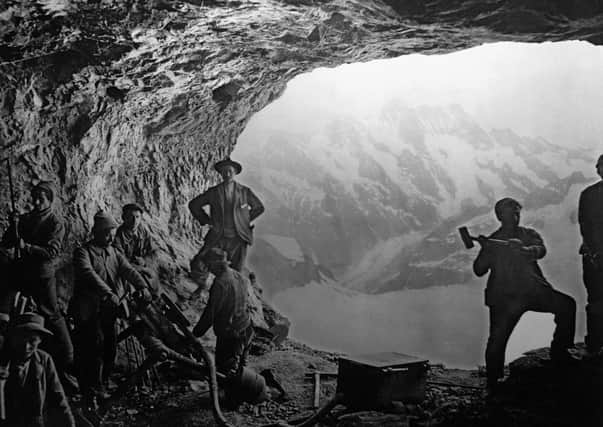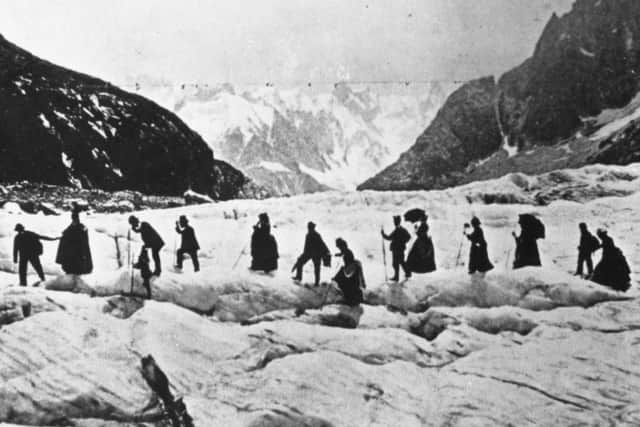Mountain training


They called themselves the Junior United Alpine Club. It was a rather grand title for a group who couldn’t ski and who had little in the way of mountaineering equipment. However, what they lacked in experience they made up for in sheer enthusiasm.
This small party had set off from Newhaven with more than 120 others in June 1863. They were part of Thomas Cook’s inaugural tour of Switzerland, but only they made it to the final destination some three weeks later. About half went only as far as Paris, while another lot said their goodbyes in the shadow of Mont Blanc. By the time they crossed into Switzerland only the most intrepid remained.
Advertisement
Hide AdAdvertisement
Hide AdThat half dozen or so included Miss Mary, a French interpreter, Miss Sarah, who described herself as a “continental traveller”, guide and philosopher Miss Eliza, Mr James, a poet laureate and a Miss Jemima Morrell, a 31-year-old artist from Selby.


The unmarried daughter of a bank manager lived in middle class comfort. The family had enough money for both a cook and a housemaid, but Jemima also had a thirst for adventure. Along with her brother Tom, she spent three weeks travelling through Europe and in neat, handwritten diaries waxed lyrical about the highs and bluntly detailed the lows of the trip. Then, 150 years later, a brief mention of Miss Jemima’s Swiss Journal sparked the imagination of another writer.
“Back in 2009 I started researching Swiss history and tourism and the journal was mentioned in a small aside in the Rough Guide,” says author Diccon Bewes. “I went online and it just took a few clicks to find a copy of the 100th anniversary edition. I didn’t know then just how important those diaries would become to me.”
However, two years later, Diccon found himself in Newhaven about to embark on a recreation of Miss Jemima’s tour. In his bag, along with a copy of her journal, he had the 1861 edition of A Handbook for Travellers in Switzerland and while Jemima had her brother for company, Diccon took his mother.
Advertisement
Hide AdAdvertisement
Hide Ad“People have an image of Switzerland as being this incredibly rich country, but it wasn’t always that way. In fact when Thomas Cook organised that first tour party it was actually incredibly poor.
“It has no natural resources, it doesn’t have a coastline and while its landscape is what attracts tourists now to those who lived there the mountains were more of an obstacle.”
For Cook that first trip was a fact finding mission and Jemima and the rest of the Junior United Alpine Club were his guinea pigs.
He needed to test out the rail network, he wanted to know what they thought of the accommodation and most of all he needed to know that there was an appetite for the Swiss air.
Advertisement
Hide AdAdvertisement
Hide Ad“The way Jemima writes sounds almost Dickensian and it’s easy to think of her as the archetypal prim and proper Victorian, but in fact she’s incredible witty, occasionally acerbic and the very fact she was on this trip shows she had a spirit of adventure,” says Diccon.
“Most middle class women didn’t travel and if they did it was in the company of an elderly aunt. It was all terribly A Room with a View.
“This trip, however, was different. Essentially they sent their Sunday best on ahead and survived on whatever they could carry in a knapsack which was not a lot. They effectively wore the same clothes every day, all the while walking for hours in the heat of the summer and without a daily bath.”
Part of the reason for retracing Miss Jemima’s steps was to discover how much the destinations on the route had changed. Most were still a magnet for tourists with the number of hotels having swelled, but some things had disappeared. In the mid-19th century Montenvers was home to the Mer de Glace, an enormous sea of ice. Now it’s little more than a river of rubble.
Advertisement
Hide AdAdvertisement
Hide Ad“You still get a sense of the scene which confronted those early travellers and back then they came not just to admire the glacier, but to walk across it,” says Diccon. “They had no training, no equipment and there were countless bottomless crevasses waiting to swallow anyone who missed their step. But they seemed unconcerned. They put on their hats, picked up their sticks and went for a jolly hike across to the other side.”
Having pulled on hobnail boots and hitched up her crinoline, Miss Jemima wrote in one diary entry: “How strange, how intensely incongruous it felt on that hot summer’s day to be crunching ice under our feet and to be looking down yawning crevasses that showed 80 and 100ft of their blue crystal-line jaws.”
Another day they negotiated the Mauvais Pas (French for bad step) where the only thing to prevent them falling 400ft from the slippery ledge was a rope handrail fastened to the rock. This they took in their stride, in fact it was only when they reached the mineral baths at Leukerbad as they crossed into Switzerland that their English sensibilities were tested. In one large pool, they found men sitting for up to 10 hours a day, passing the time playing draughts while the women would sip tea as the waters lapped around their chests.
“We followed them not as bathers, but as observers,” wrote Miss Jemima. “It is difficult to shake off the feeling that we were indulging in an excess of curiosity and still more difficult to maintain a sobriety consistent with good manners.”
Advertisement
Hide AdAdvertisement
Hide AdFor all the new experiences when the party arrived back on home soil on July 16, the feeling was one of relief. “The memory of our three weeks holiday has many bright spots,” she wrote. “But none in their way more precious than the happiness we experienced in setting foot on an English shore and hearing our mother tongue again.”
However, as Miss Jemima made her way back to Selby, the journey was only just beginning for Cook who was busy devising a raft of new itineraries.
“He unwrapped the Alps with his package tours making them accessible for people with limited time and money,” says Diccon. “For many they are now just another holiday stop, another photo for the digital album, another tick off the wish list. But even if their romantic mystique has diminished their natural splendour has not.”
Diccon Bewes will be talking about his new book at Waterstone’s in York on November 18 at 6.45pm. 01904 628740. Slow Train to Switzerland, published by Nicholas Brealey, priced £18.99, is out now.